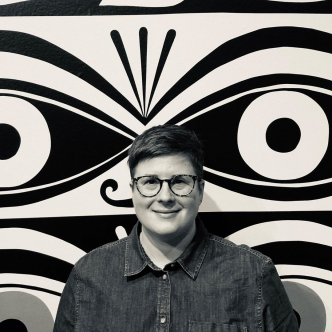MA Arts and Culture: Contemporary Literature and Arts (CLA)
Interview with course coordinator Eliza Steinbock
Dr. Eliza Steinbock (they/them) works at FASoS as Associate Professor of Gender and Diversity Studies within the Literature and Art department, joining the research programme of Arts, Media and Culture as a board member. They are an affiliated researcher of the Centre for Gender and Diversity and to the Maastricht Centre for Arts and Culture, Conservation and Heritage.
When we asked them what their contribution to the CLA programme is, they answered: “I am the course coordinator and tutor for Researching the Field: Cultural Objects, Theories and Methods. I teach on cultural theories and methods and will also be discussing how researchers position themselves in relation to their research topic and issues like racism, sexism, classism and transphobia. My specialization is in cultural analysis, affective methods and combining methods such as interviewing with close reading/looking, and archival research.”
They explained that the CLA programme combines the best of studying arts and culture with the critical edge of feminist thought and a cultural studies approach that does away with notions of low and high culture.
During the programme you will be taught several professional skills, Eliza explained. “We will train in 21st century professional skills: critical thinking, collaborative and independent research, and soft skills such as group moderation and decision-making that are key to any work placement. The exciting aspect of our programme is how you can combine the study with an internship and also take an elective in another specialisation of the MA Arts and Culture programme to tailor your study to learning particular professional skills.”
They also told us that this programme will suit students who want to make a difference in the world, “to become an agent of change, and wish to gain the theoretical vocabulary and familiarity with activisms and cultural agitators that brings clarity and understanding of the major socio-cultural challenges we face today. Students will need to have an open mind and be willing to practice self-reflection.”
Current events that are discussed during the programme are Gentrification, urban activism to remove racist statues, human-animal relations, ecological disasters, transitional justice in post-conflict societies, the future of diversity and inclusion in museums, aging societies, disability discourses
When we asked them what the career perspectives are with this programme, they told us that graduates are prepared to enter the job market of the cultural sector, research, consulting, and policy
On the question, “what makes this programme so unique?” they answered: “This programme tackles the major issues of the day through the lens of cultural change. It combines the study of major texts in the field with current research and examples. It understands that knowledge production occurs in academic, activist and artistic domains, and draws on all of these in its courses.”
Lastly, they said: “Studying at Maastricht University is a unique experience, with its small-scale and hands-on way of organizing tutorial groups. You will have the benefit of accessible professors and a close-knit cohort. The city is also a dynamic place to study, with a lively student life, arts scene, and strong cultural institutions such as the Bonnefanten Museum and the Jan van Eyck Academy.”
April 2022

Dr. Eliza Steinbock